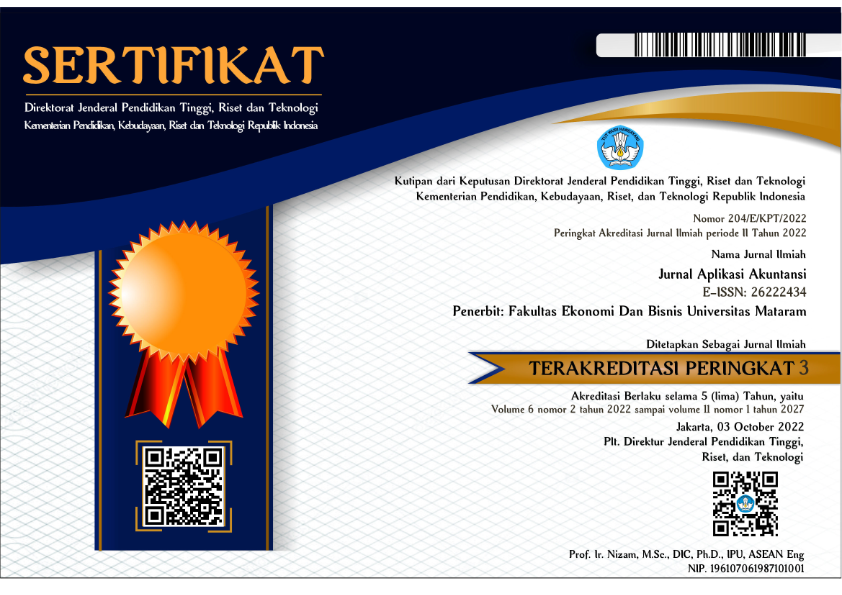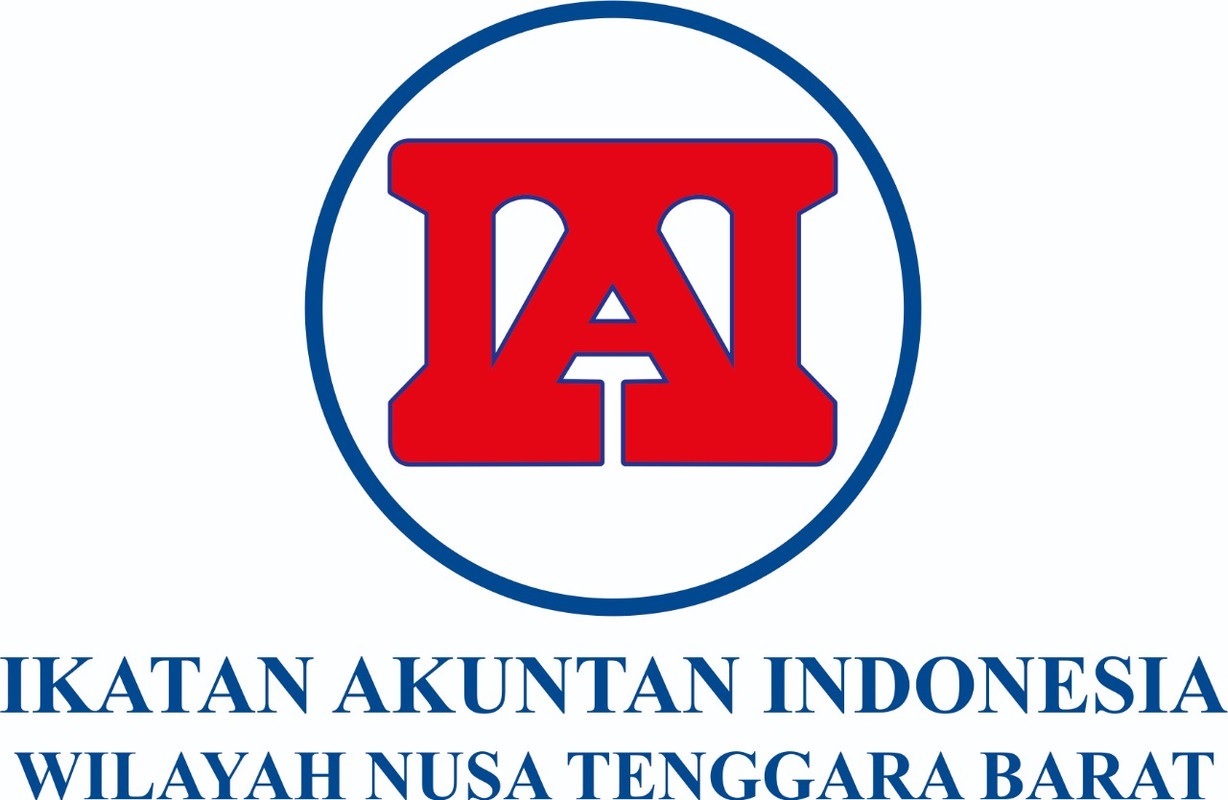DETERMINANTS OF FIXED ASSET REVALUATION DECISIONS WITH FIRM SIZE AS A MODERATING VARIABLE
DOI:
https://doi.org/10.29303/jaa.v9i2.536Keywords:
Fixed Asset Revaluation, Fixed Asset Intensity, Leverage, Liquidity, Firm SizeAbstract
This study uses firm size as a moderating variable to investigate how fixed asset revaluation decisions are impacted by fixed asset intensity, debt, liquidity, operating cash flow, and company growth. All of the study's objects are businesses in the financial industry that are listed on the IDX. Purposive sampling yielded 90 organizations with a total observation data of 450 based on the following criteria: companies listed on the IDX in 2019-2023, publishing complete annual reports in 2019-2023, having fixed assets consecutively during 2019-2023, and companies that use rupiah currency are 90 companies with a total observation data of 450. The collected data were analyzed using logistic regression and moderation regression analysis for hypothesis testing. The results showed that the decision to revalue fixed assets is influenced by both fixed asset intensity and liquidity, indicating that businesses with high fixed asset intensity and low liquidity are more likely to decide to revalue. Leverage, operating cash flow, or company development have no impact. This result suggests that elements influencing a firm's decision to revalue its fixed assets are not leverage, operating cash flow, or company growth. The impact of debt and liquidity on fixed asset revaluation choices is then reinforced by business size as a moderating element. The implications of this research indicate that the revaluation method can enhance the relevance and quality of the information presented in financial statements because the motivation for revaluing fixed assets is to obtain information related to the fair value of fixed assets. Management policies for evaluating fixed assets are one way to improve the company's performance.
References
Azizah, D. U. (2022). Pengaruh Revaluasi Aset Tetap Terhadap Kinerja Masa Depan pada Perusahaan yang Terdaftar di Bursa Efek Indonesia (BEI). https://eprints.iain-surakarta.ac.id/3509/1/Skripsi-Devi Ulfah A-185221102.pdf
Dedrick, G., & Tedjasuksmana, B. (2019). Pengaruh Leverage, Market-To-Book Ratio, Likuiditas dan Intensitas Aset Tetap Terhadap Keputusan Revaluasi Aset Tetap. Jurnal Akuntansi Kontemporer, 11(2), 74–84.
Diantimala, Y., Syahnur, S., & Ridwan, R. (2019). Factors Influencing Asset Revaluation by Indonesian Listed Companies in IFRS Implementation. Advances in Social Science, Education and Humanities Research, 292(Agc), 452–459. https://doi.org/10.2991/agc-18.2019.68
Evi, T. (2019). Determination of Asset Revaluation. Jurnal Riset Manajemen Dan Bisnis (JRMB) Fakultas Ekonomi UNIAT, 4(3), 395–404. https://doi.org/10.36226/jrmb.v4i3.295
Faisal, A. R., & Murwaningsari, E. (2019). Determinant of Asset Revaluation and Corporate Value (Study on Indonesia Stock Exchange). International Journal of Business, Economics and Law, 18(5), 22–27.
Fathmaningrum, E. S., & Yudhanto, S. K. (2019). Determinants of Fixed Asset Revaluation Decision and Its Impacts on Market Reaction: A Comparative Study in Indonesia and Singapore. Journal of Accounting and Investment, 20(2). https://doi.org/10.18196/jai.2002118
Fioni, D., Darmayanti, Y., & Rifa, D. (2019). Pengaruh Jaminan Utang, Penurunan Arus Kas dari Aktivitas Operasi dan Fixed Asset Intensity Terhadap Revaluasi Aset Tetap. Reviu Akuntansi Dan Bisnis Indonesia, 3(1), 27–37. https://doi.org/10.18196/rab.030134
Firmansyah, D., Ahmar, N., & Mulyadi, J. (2017). The Effect of Leverage, Size, Liquidity, Operating Cash Flow on Fixed Asset Revaluation. The Indonesian Accounting Review, 7(1), 31–43. https://doi.org/10.14414/tiar.v7i1.816
Haykal, M., & Munira, R. (2021). Pengaruh Leverage, Penurunan Arus Kas Operasi, Fixedasset Intensity, dan Pertumbuhan Perusahaan Terhadap Keputusan Revaluasi Aset Tetap. Jurnal Akuntansi Dan Keuangan, 9(2), 79. https://doi.org/10.29103/jak.v9i2.4682
Jannah, R., & Diantimala, Y. (2018). Faktor-Faktor yang Mempengaruhi Perusahaan Melakukan Revaluasi Aset Tetap Sesuai dengan PSAK 16 (2015) Di Indonesia. Jurnal Ilmiah Mahasiswa Ekonomi Akuntansi (JIMEKA), 3(3), 1.
Jaya, D., Jati, E., Ningsih, W., & Wijayanti, A. (2020). Incentives for Revaluations Fixed Asset. International Journal of Innovation, Creativity and Change, 13(10), 799–812.
Kholilah, K., Rahman, A. F., Atmini, S., & Ghofar, A. (2024). Opportunistic motivation on fair value accounting of investment properties: Does corporate governance matter in Indonesia? Journal of Social Economics Research, 11(1), 73–85. https://doi.org/10.18488/35.v11i1.3611
Latifa, C. A., & Haridhi, M. (2016). Pengaruh Negosiasi Debt Contracts, Political Cost, Fixed Asset Intensity dan Market to Book Ratio terhadap Perusahaan Melakukan Revaluasi Aset Tetap (Studi pada Perusahaan Manufaktur yang Terdaftar di Bursa Efek Indonesia Tahun 2010 - 2014. Jurnal Ilmiah Mahasiswa Ekonomi Akuntansi (JIMEKA), 1(2), 166–176.
Lin, Y. C., & Peasnell, K. V. (2000a). Asset revaluation and current cost accounting: UK corporate disclosure decisions in 1983. British Accounting Review, 32(2), 161–187. https://doi.org/10.1006/bare.2000.0128
Lin, Y. C., & Peasnell, K. V. (2000b). Fixed asset revaluation and equity depletion in the UK. Journal of Business Finance and Accounting, 27(3–4), 359–394. https://doi.org/10.1111/1468-5957.00317
Nailufaroh, L. (2019). Determinan Keputusan Perusahaan Melakukan Revaluasi Asset Tetap. Jurnal Akuntansi, 6(1), 1–19.
Poerwati, R. T., Hardiningsih, P., Srimindarti, C., & Sundari, R. I. (2020). Does the Company's Scale, Fixed Asset Intensity and Operating Cash Flow Affect Asset Revaluation? Jurnal Analisis Bisnis Ekonomi, 18(1), 1–13. https://doi.org/10.31603/bisnisekonomi.v18i1.3342
Prabandari, A. R., & Kholilah, K. (2024). Subsequent Measurement for Investment Property: Fair Value Model. Jurnal Reviu Akuntansi Dan Keuangan, 14(03), 667–684. https://doi.org/10.22219/jrak.v14i3.29608
Pradita, R. A., & Suryono, B. (2019). Pengaruh Kinerja Keuangan Terhadap Nilai Perusahaan dengan Pengungkapan Corporate Social Responsibility sebagai Variabel Moderasi. Jurnal Ilmu Dan Riset Akuntansi, 1–18. https://doi.org/10.31932/jpe.v4i2.567
Salsabil, N. H., & Alliyah, S. (2024). Factors That Affecting Revaluation of Fixed Assets in Manufacturing Companies. Jurnal Aplikasi Akuntansi, 8(2), 336–345. https://doi.org/10.29303/jaa.v8i2.361
Sartika, M., & Syahdan, S. A. (2020). Determinan yang Memengaruhi Revaluasi Aset Tetap Pada Perusahaan Manufaktur yang Terdaftar di Bursa Efek Indonesia Pada Tahun 2018-2020. 1, 218–232.
Satriawan, A., & Baroroh, N. (2021). Revaluasi Aset Tetap dengan Likuiditas sebagai Variabel Moderating (Studi Perusahaan Sektor Properti, Real Estate, and Building Construction yang Terdaftar di Bei 2017-2020). Jurnal Akuntansi Dan Auditing, 18(1), 76–91. http://journal.unilak.ac.id/index.php/JIEB/article/view/3845%0Ahttp://dspace.uc.ac.id/handle/123456789/1288
Seng, D., & Su, J. (2010). Managerial Incentives Behind Fixed Asset Revaluations: Evidence from New Zealand Firms. Department of Accountancy and Business Law, 3(3), 2–33.
Sitepu, H. B., & Silalahi, E. R. R. (2019). Pengaruh Intensitas Aset Tetap, Leverage, Likuiditas, Pertumbuhan Perusahaan Dan Ukuran Perusahaan Terhadap Revaluasi Aset Tetap Pada Perusahaan Manufaktur Sektor Industri Dasar Dan Kimia Yang Terdaftar Di Bursa Efek Indonesia. Jurnal Riset Akuntansi & Keuangan, 5(2), 165–190. https://doi.org/10.54367/jrak.v5i2.156
Spence, M. (1973). Job Market Signaling. 87(3), 355–374.
Tay, I. (2009). Fixed Asset Revaluation: Management Incentives and Market Reactions. Thesis Master of Commerce and Management Lincoln University, 1–111. http://dspace.lincoln.ac.nz/bitstream/handle/10182/1555/Tay_MCM.pdf?sequence=3
Teguh, A. A., Boedi, S., Asiah, A. N., & Syam, A. Y. (2022). Revaluasi Aset Tetap Perusahaan Manufaktur di Indonesia. Kinerja, 19(2), 356–361. https://doi.org/10.30872/jkin.v19i2.11107
Teruni, R. R., Qadri, R. A., Putra, R. T., & Firmansyah, A. (2022). Does Accounting Information Become Pertinent To Asset Revaluation Decisions? Assets: Jurnal Akuntansi Dan Pendidikan, 11(2), 134. https://doi.org/10.25273/jap.v11i2.11930
Watts, R. L., & Zimmerman, J. L. (1990). Positive Accounting Theory. In The Accounting Review (Vol. 65, Issue 1, pp. 131–156). https://faculty.etsu.edu/POINTER/watts&zimmerman2.pdf
Yulistia, R., Fauziati, P., Minovia, A. F., & & Khairati, A. (2015). Pengaruh Leverage , Arus Kas Operasi , Ukuran Perusahaan dan Fixed Asset Intensity Terhadap Revaluasi Aset Tetap. Simposium Nasional Akuntansi, September 2015.
Yulistia, R., Septiyani, N. D., Minovia, A. F., & Yunilma, Y. (2021). Leverage, Arus Kas Operasi, Ukuran Perusahaan, Intensitas Aset Tetap dan Revaluasi Aset Tetap. Wahana Riset Akuntansi, 9(1), 1. https://doi.org/10.24036/wra.v9i1.111817
Željana Aljinović Barać, S. Š. (2011). Motives for Asset Revaluation Policy Choice in Croatia. Croatian Operational Research Review, 2. https://doi.org/10.1049/iet-com.2015.1015
Downloads
Published
How to Cite
Issue
Section
License
Copyright (c) 2025 Nur Havifa Safitri, Kholilah

This work is licensed under a Creative Commons Attribution-NonCommercial-ShareAlike 4.0 International License.









